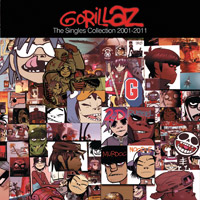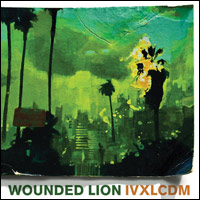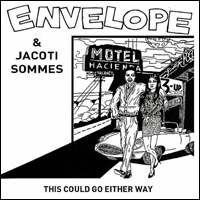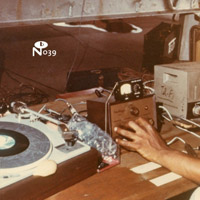
The Singles Collection: 2001–2011
Virgin
At the time, it seemed like more of a lark than anything. The idea of Blur front man Damon Albarn, producer Dan the Automator and Tank Girl creator Jamie Hewlett getting together to launch a virtual band was so strange it seemed to make perfect sense. But no one could have imagined how big the project would get. While everyone knew about the actual humans involved, the trio hid behind the cartoon personas of the Gorillaz—lead singer 2D, bassist Murdoc, guitarist Noodle and drummer Russel—while constructing an elaborate world combining animation, the internet and music into a multi-layered experience. It was pretty shocking how real the band seemed, a fact all the more cemented after 10 years, four albums and now the release of the proverbial greatest hits package, The Singles Collection: 2001–2011.
The cliche advises to never judge a book by its cover, but in this case, it’s actually a pretty wise idea. The Singles Collection is exactly as advertised, with a couple of remixes and alternate versions thrown in for good measure. In other words, completely unessential if you have the Gorilaz’s unabridged catalog, even with a DVD of the band’s videos. But for the casual fan this is the perfect overview, and with a cartoon band, is it possible to be anything other than a casual fan? It also makes it easy to compare the three different phases of the Gorillaz: the Automator years, the Danger Mouse years, and the Albarn years. The songs are simply sequenced in chronological order, progressing from gritty rock to become more polished and slightly more poppy. The artificiality of the Gorillaz makes them malleable to go in a variety of different directions and any band that can draft Del the Funky Homosapien, Miho Hatori of Cibo Matto, De La Soul, Mark E. Smith, Bobby Womack, and Mick Jones and Paul Simonon of The Clash while still sounding coherent is nothing less than a miracle.
Dorian S. Ham

IVXLCDM
In the Red
With its self-titled album last year, Los Angeles’ Wounded Lion proved nothing is ever what it seems. Though the record appeared comprised of simple garage rock, there was more going on than was readily apparent. The album’s cuts found their way into your head and heart through side entrances, the band’s collective squawk underpinned with idiosyncratic guitar lines and oft-kilter beats that were nevertheless undeniably hard to deny digging.
IVXLCDM is similarly hard to resist and untamable. Now with former Intelligence honcho Lars Finberg lending a hand or two on drums and guitar, the band begins with “Monkeys,” an off-kilter mix of hardcore aggression and musical aptitude that comes off like Hüsker Dü while asking the philosophical question of “which (kind of monkey) are you?” The record gets hairier as it progress, but that’s part of its charm. The band spits out songs that are askew, but thick as a Manhattan phone book, while showing an overt intelligence. On “Relaxation Is My Specialty,” they reveal a self-referrential aptitude in lines like, “They say our hair is too long... Our hair is just the right length. We’re getting things done.” One gets the sense elsewhere, on tracks like “Sacagawea” and the (relatively) epic “Raincheck Vibrations,” that the band is moving towards something. That they probably don’t know what it is yet is okay—we can all enjoy the ride together.
Stephen Slaybaugh

This Could Go Either Way ep
Palais du Pomeroi
I live in Columbus, but I couldn’t tell you the first thing about the city’s vibrant hip-hop scene. What I can tell you about is Tony Envelope, who’s not exactly an anomaly among that crowd but certainly represents the antithesis to your average Midwestern rapper. For one, he’s more likely to appear on stage at a rock club than on a bill filled with emcees. That predilection has him sharing the DIY aesthetics of Columbus bands like Times New Viking and Psychedelic Horseshit and starting his own label, screen-printing his own covers, and celebrating the release of his latest EP with a tour of eight local record stores rather than throwing a single release party. This Could Go Either Way cements Envelope’s urge to do things different. To hell with the rap game, the man has no time for games. While the EP is steeped in Low-End Theory–inspired samples and beats, the entirety was composed and performed by Jacoti Sommes, engineered on analog tape, and mixed by Adam Smith at the usually punk enclave of Columbus Discount Recordings. This approach brings space and warmth, with Somme’s retro-futuristic synth melodies and the songs’ infectious throwback feel merging perfectly with Envelope’s playful “drinkin’ thinker” cadence.
At this point, Envelope has developed a defined flow, often focusing on the quotidian tales of life in Columbus, including everything from relationships, beer, and local politics. A special trait of Envelope’s narratives is his tendency to vocalize the house party philosophies and self-deprecating thoughts swirling in his head. On “Lucky Duck,” he asks himself, “Am I an existentialist? I guess I am,” in a tone that suggests perhaps that was something the listener wasn’t supposed to hear. They aren’t deep thoughts per se, just charming observations most would keep to themselves. Even if in form among the lexicon of hip-hop, This Could Go Either Way is pioneering, though the record is not that far removed from the function of old-school jams. There are crew chants and asides on “Zip Zero,” spot-on guest spots (The Catalyst’s verse on “We’re All Gonna’ Die Together” is a thrilling addition), and a general adoration for the classics here with an ultra-likeable and wholly relatable character pulling the strings. One would be hard-pressed not to call it hip-hop, but by the time the catchy refrain of finale “You Want Me to Go” rolls through devoid of all the gimmicks and bling of that fickle genre, I’m tempted to call it anything but.
Kevin J. Elliott

Eccentric Soul: The Nickel and Penny Labels
Numero Group
As Chicago’s Numero Group continues its epic reissue campaign, it’s perhaps prudent to at least consider the following thought: if you want a story, buy a book. To fully appreciate the sounds on a record, one should in theory require no context. Everything you need to know should be in the grooves. The famed Chains and Black Exhaust funk-rock comp doesn’t even have titles, and it slays. Sure, one wonders about what exactly went in to making those bizarre post-Hendrix sides, but the music trumps the tale.
Yet for better or worse (and really, truth be told, it’s something of a stretch to argue the worse), that’s simply not the Numero MO. Although every individual release needs to be assessed firmly on its own merits, it’s hard not to approach each new set as part of the larger context of the label’s mission. Arguably, the most important above-board crate-digging concern currently functioning, Numero is as much about unearthing narrative and history as it is actual music. While the rich stories that surround and reanimate long forgotten mom and pop record outfits are not essential to the listening experience, to completely cast them asunder would be a disservice to something like The Nickel and Penny Labels, the latest installment in Numero’s ongoing Eccentric Soul series.
Like many of the installments in the series, Nickel and Penny inevitably centers more on an individual than an actual label. In this case, that man is Richard Pegue. A tireless Chicago-based writer, producer, DJ and music business mover and shaker, Pegue also brought home the bacon as a commercial jingle writer. (As an aside, it would have been interesting to throw a few of these on the disc to give a full picture of his approach to making music.) While none of the tracks here ever became hits, they were ready-made for the kind of unjust obscurity that Numero so relishes in correcting. Pegue himself even helped give shape to the idea of a DJ dedicated not to the latest smash but to would-be R&B classics, what he called “The Best Music of Your Life.”
It is indeed an interesting story, but once again, that’s not necessarily the paramount point of releasing records. So how’s the music? Like all Numero releases, Nickel and Penny is composed of undeniably solid soul and funk. Not every track is a stone-cold killer, but there are more than a few brilliant moments. The South Shore Commission’s take on Sam and Dave’s “You Got Me Hummin’” pushes the original percolating groove to a near boil; the Voices’ “Fall in Love Again” has a nice Motown-esque propulsion and would fit snuggly on any upstanding Northern Soul set list; while Jerry Townes’ reworking of the traditional “Your Are My Sunshine” jumps out of the speakers in an explosion of slinky, jangling funk. Several of the tracks, not surprisingly, lean to the mellifluous style for which Chicago soul was known (Little Ben & the Cheers’ “(I’m Not Ready to) Settle Down” being a stand-out), but the set is stylistically diverse and traces the larger evolution of styles in R&B from the ’60s into the ’70s. Fans of vintage of R&B, soul, and funk will be more than pleased—not only with the music but with the reminder that the well for this sound is far from dry.
And just in case the music isn’t enough, Numero has, as always, laid out an exhaustive retelling of the labels’ and Pegue’s unique stories in a deluxe package with detailed liners that account for everything from the start-up deals and backroom negotiations to the recording process and notes on the individual artists. It’s not as exciting as the music, but yeah, it’s nice.
Nate Knaebel

No Future
HoZac
Heather Fedewa, who as the liner notes put it, is Wax Idols, may have been feeling nihilistic when she named her debut full-length or she may have just wanted to make a gesture of respect to her punk forefathers, but the title is a misnomer as to what comes coursing through the speakers when the needle hits No Future. “Dead Like You” and “Human Condition” deal in some version of despondency, but Fedewa rarely gives the impression of being at wit’s end. No, No Future is a perky collection of songs that seemingly revel in their very state of being. Cuts like “Dilno” and “Hotel Room” deal in three-chorded gusto, churlish vocals bouncing off of buzzsaw guitars. Think a female Hives. Fedewa manages to keep the formula from coming off run-of-the-mill over the course of 11 songs by never staying in one place too long, continuously making tweaks and slight turns to keep a sense of unpredictableness. As such, each guitar squawk gives way to a vocal melody and each acoustic reverie recedes to reveal a noisy epiphany. Yeah, “No Future” is certainly selling Fedewa’s project short, as there is enough compelling material to comfortably predict much more music from the Wax Idols in the coming years.
Stephen Slaybaugh
ALBUM REVIEWS
The Duke Spirit, Bruiser
Lateef the Truthspeaker, FireWire
She & Him, A Very She & Him Christmas
Ty Segall, Singles 2007-2010
Los Campesinos, Hello Sadness
Thee Oh Sees, Carrion Crawler/The Dream
Noel Gallagher's High Flying Birds, Noel Gallagher's High Flying Birds
Pterodactyll, Spills Out and Arnold's Park
Joker, The Vision
Atlas Sound, Parallax
David Lynch, Crazy Clown Time
Oneohtrix Point Never, Replica
Tycho, Dive
Summer Camp, Welcome to Condale
